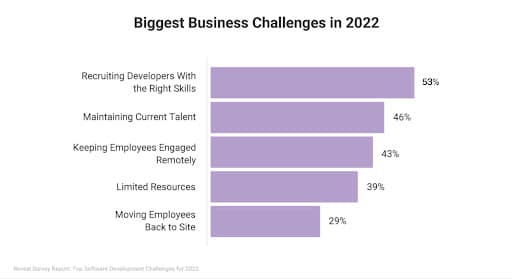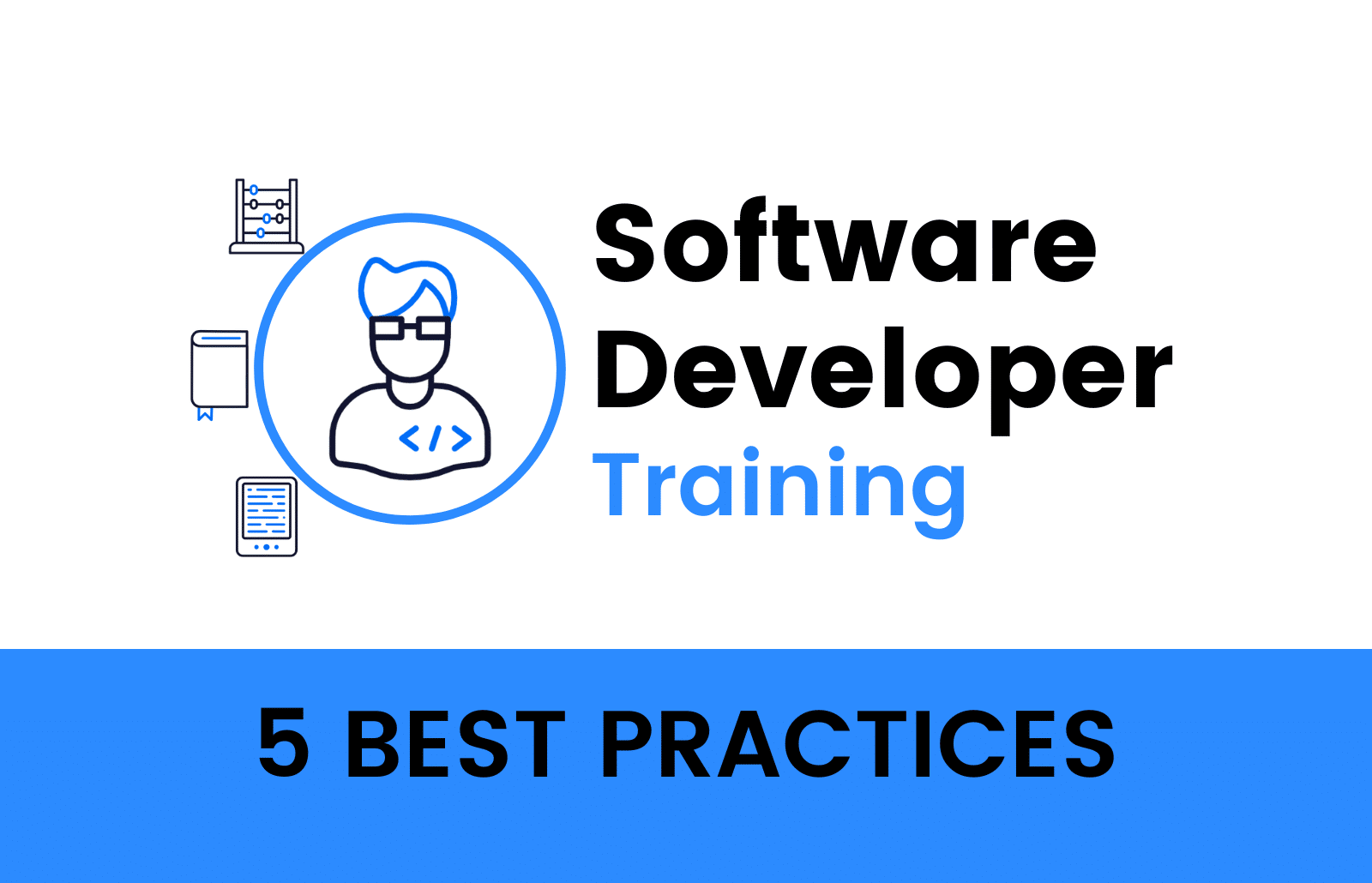There are 26.2 million developers worldwide. Surely that’s more than enough to meet the needs of modern businesses, right?
Wrong. It’s not just a numbers game.
A recent Infragistics study revealed that the biggest business challenge in 2022 won’t be recruiting engineers. It will be recruiting engineers with the right skills.

To keep your competitive edge and continue building innovative digital products, you must ensure that your developers stay on top of their game and the technology curve. The best way to do this is to provide them with world-class software developer training on the job.
With this in mind, let’s explore a handful of strategies and tools for enabling effective developer training.
5 Tips for Improving Your Software Developer Training Program
Here are five best practices for providing on-the-job training for software developers:
1. Allocate Time for Self-Directed Learning
You cannot (and should not) expect developers to learn and practice new skills in their own time. Not only does this have a negative effect on work-life balance and overall productivity, but you’re also not likely to achieve significant and consistent results.
If you’re serious about promoting a continuous learning culture, you need to build learning into the system. Have engineers set quarterly and yearly learning goals as part of their career development plans and make sure they have enough time to learn during working hours. Don’t overburden them with work, set realistic deadlines, and help them block out dedicated time slots on the calendar for independent study.
2. Enable Peer-to-Peer Learning
While self-directed learning is potentially very beneficial, it can only get you so far. As a business leader, you should go beyond self-learning and try to foster knowledge sharing and idea transfer between your engineers.
You can do this through small group sessions, companywide webinars, or internal projects with a focus on improving developer skills through collaboration. It’s also a good idea for senior team members to act as designated mentors or coaches to less experienced developers to help them grow.
3. Schedule Reviews and Feedback Sessions
Whether your engineers are pursuing self-directed learning, peer-to-peer exchange, or traditional courses, external accountability is a must for ensuring the quality of your software development training program.
To that end, you should schedule regular reviews and feedback sessions — ideally, on an individual basis. Use that time to assess progress made, offer constructive criticism, identify opportunities for improving specific technical and other essential skills, and design a personal learning path or timeline for the next leg of the learning journey.
4. Equip Your Teams with the Tools They Need to Succeed
To set your engineers up for success, make sure they have the right tools and know how to use them. Provide them with access to:
- Online learning platforms
- Instructor-led trainings
- Industry conferences
- Online courses
- Databanks with verified content
- Other digital resources
- Various communication and sharing channels
A company GitHub or stack overflow repository developers can contribute to and iterate with the team is also essential.
You may also consider setting aside a dedicated learning budget that engineers can tap into when and as needed (within limits, of course).
5. Tailor Developers’ Training to Their Needs
Last but not least, don’t forget that we all have different learning styles. To enable developers to make the most of the educational opportunities at their disposal, you should cater to their individual needs.
Consider each developer’s career path, future goals, and the skills they seek to gain or need to improve — and adapt the training where possible. Provide individualized mentoring, guidance, and feedback and try to strike a balance between the engineer’s interests and the company goals to work out a win-win scenario.
Extra Tips for Training Junior Developers
Entry-level software developer training can be tricky. While all tips from the previous section apply here as well, there’s a little more work that goes into helping young engineers lay a solid foundation to build on in the future.
1. Design a Detailed Training Plan
Having a personalized training strategy for each developer is essential regardless of their seniority. However, it’s especially important when training less experienced professionals.
Senior developers are more likely to know what skill they need to improve or which specialization to add to their existing skills. Younger developers may need more guidance — but you should still acknowledge their preferences, of course.
2. Appoint Personal Mentors
Again, this may be optional or unnecessary with more experienced developers, but fledgling engineers need all the help they can get. Having a designated person to answer questions, provide feedback, or simply confide in after a hard day’s work can be a real game-changer.
Remember, this is not school anymore, so the mentor-mentee relationship shouldn’t be too formal. The mentor can be a coworker the developer gets along well with and who’s willing and able to guide them on their career path.
3. Allow Them to Learn by Doing
There’s more to learning software development than amassing theoretical knowledge. It’s a creative process that involves learning by doing.
To help engineers develop trust in their abilities, assign tasks so that they can test their coding skills on a real-life software project while also generating value for the company. When they’re done, run the result through a robust system of code reviews, checks, and approvals. This way, developers get to receive and learn from valuable feedback, and you can guarantee the quality of the product.
4. Provide Good Feedback
Timely, accurate, and detailed feedback is crucial for junior professionals to learn and grow. Schedule regular time slots in your calendar to provide constructive (and kind) criticism and suggest next steps and new learning opportunities.
That said, it’s also important to allow developers the space to learn at their own pace and make mistakes. Don’t criticize them too harshly as long as they learn from their experience.
Be sure to acknowledge and celebrate progress and great work, too.
Need Help Setting Up Your Software Developer Training Program?
That’s a lot more common than you might think. Running a business is hard enough as it is for you to also think about fitting developer training into your already busy schedule.
At Zartis, we have your back. We offer best-in-class consulting services, expert training, and advice in software development best practices, architecture, infrastructure, DevOps, QA, and more.
Check out our Technology Consulting services to learn more.


